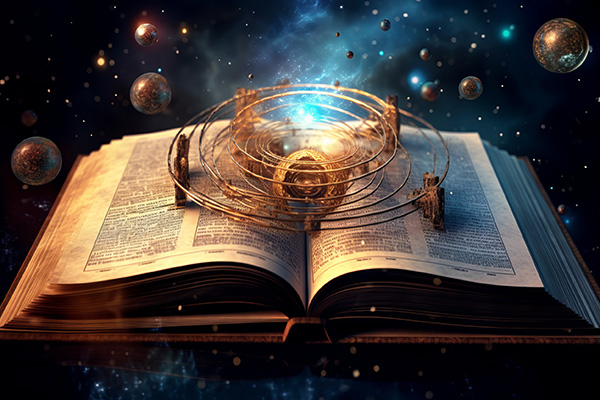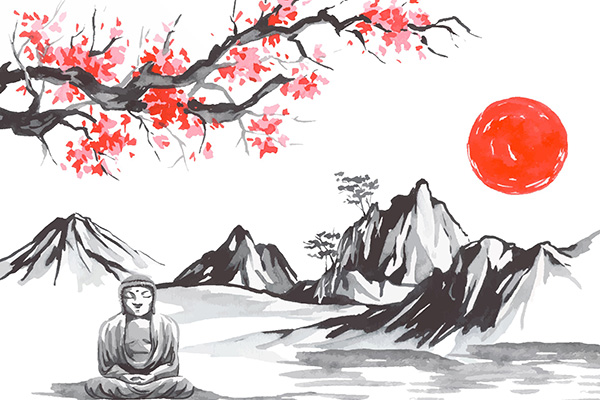philosophy
The Transformative Power Of Finding Your Faith
 Faith is deeply personal and means different things to different people. It can take many forms, such as spiritual faith in a higher power, personal faith in one’s abilities, or faith in the people and principles that shape our lives.
Faith is deeply personal and means different things to different people. It can take many forms, such as spiritual faith in a higher power, personal faith in one’s abilities, or faith in the people and principles that shape our lives.
For some, faith is a guiding force that offers comfort and meaning. For others, it’s a leap into the unknown, choosing hope over doubt. It can be rooted in a religious tradition, philosophical principle, esoteric teaching, or the simple belief that tomorrow holds possibilities unseen today.
Whatever our beliefs, faith is an intense and often unshakable certainty in those beliefs despite the absence of proof. To me, faith is a powerful, transformative force. When embraced, it offers immeasurable strength in the face of life’s challenges.
When I was young, I struggled to grasp the concept of faith. I never doubted the existence of a creator. I never doubted an afterlife or the presence of spirits in our lives. Perhaps this was due to my innate sensitivity to energies and spiritual disposition. I moved through life guided by intuition.
Yet despite my spiritual grounding, my faith was tested repeatedly, especially through experiences of trauma and loss.
I wrestled with questions of purpose and fairness. I couldn’t accept the idea of a cruel or indifferent creator who randomly punished or rewarded people.
The Ancient Art Of Facial Reading
 Physiognomy is an ancient belief system that the face reveals the hidden truths of the mind, body, and spirit. In many cultures, the face is seen as a reflection of the soul or inner self.
Physiognomy is an ancient belief system that the face reveals the hidden truths of the mind, body, and spirit. In many cultures, the face is seen as a reflection of the soul or inner self.
This belief that a person’s physical characteristics, such as the shape of their face, eyes, or nose, can reveal something about their inner nature has roots in various ancient cultures and has been practiced for thousands of years. In some esoteric traditions, facial characteristics are believed to also reveal past life influences and karmic imprints.
The face is more than just a reflection of our emotions; it is a map of our physical health, life experiences, and even our spiritual state. By observing our facial features and learning to interpret their subtle messages, we can gain valuable insights into our health and well-being.
One of the earliest and most detailed systems of face reading comes from Traditional Chinese Medicine (TCM). Chinese face reading, or Mian Xiang, dates back more than 3,000 years. Practitioners view the human face as a map of a person’s life, health, and destiny. They divide the face into different areas, each corresponding to different internal organs and emotional states. Facial analysis is used to diagnose imbalances in the body and mind.
Physiognomy was also practiced in ancient Greece. The philosopher Aristotle (384-322 BC) wrote about it, arguing that certain facial features could indicate personality traits and that there was a connection between a person’s appearance and their character. Greek scholars believed that external features, such as facial structure, could provide insight into a person’s moral and psychological makeup.
The Spiritual Significance Of A September Cleaning
 Did you know that cleaning can be so much more than a boring chore? When done mindfully and with intention, it can become a transformative ritual that aligns our physical environment and the spaces in which we live and work with higher spiritual energies.
Did you know that cleaning can be so much more than a boring chore? When done mindfully and with intention, it can become a transformative ritual that aligns our physical environment and the spaces in which we live and work with higher spiritual energies.
By clearing away dirt, clutter, and disorder as a form of mindful meditation and cleansing ritual, you can also cleanse your inner being, releasing what no longer serves you and making room for new energies to flow. The act of cleansing can then serve as a bridge between the physical and spiritual realms, allowing the harmonious flow of life force energy, or chi, through your physical environment.
Everything in the universe is interconnected, including the spaces we inhabit. Metaphysically, our homes and workplaces are extensions of our own energy field. When these spaces are cluttered or dirty, they begin to affect or even block the flow of positive energy, leading to feelings of lethargy, confusion, and spiritual stagnation. More importantly, negative energy imprints and residues tend to accumulate in our homes through our interactions with other people and the outside world. Cleansing thus becomes an essential spiritual practice, similar to meditation or prayer, that helps restore balance, flow and harmony.
The physical act of cleaning is not only about maintaining order and hygiene in our surroundings, but also about aligning our internal energies and preparing our minds for deeper spiritual engagement. It’s like meditation, but with a broom and a mop!
By systematically organizing and cleaning, we can practice mindfulness and focus on the present moment and the task at hand. As unnecessary items are discarded and surfaces are cleaned, we experience a corresponding release of old emotions and thought patterns that no longer serve us. In this way, the simple act of wiping down a shelf or sweeping a floor can become a profound spiritual practice that connects us to the sacredness of the present moment.
12 Universal Spiritual Laws You Need To Know
 Most spiritual seekers today are familiar with the universal Law of Attraction. But did you know that there are several other universal spiritual laws that govern our existence?
Most spiritual seekers today are familiar with the universal Law of Attraction. But did you know that there are several other universal spiritual laws that govern our existence?
The origins of our understanding of the universal spiritual laws are deeply rooted in various religious and philosophical traditions, as well as in the collective wisdom of human experience since the dawn of time.
Many of these spiritual laws are rooted in ancient wisdom traditions from around the world. These traditions evolved over thousands of years as sages, scholars, and spiritual leaders refined and elaborated upon the fundamental principles that govern all existence.
Mystical traditions within various religions have also played an important role in the development and interpretation of these spiritual laws. Mystics tend to explore the deeper, esoteric aspects of their faith, seeking direct experience of divine truths. Their insights and revelations have contributed to a deeper understanding of spiritual principles beyond literal interpretations of religious texts.
Philosophical traditions in ancient Greece, China, and other civilizations also contributed to the development of spiritual principles that later evolved into universal laws. Thinkers such as Plato, Aristotle, Confucius, and Laozi explored concepts related to ethics, metaphysics, and the nature of reality that influenced later spiritual teachings.
The Meditative Art Of Sumi-e Painting
 As a spiritual advisor and artist, I’ve always been drawn to the ways in which art and spirituality intersect to offer pathways to deeper self-awareness and tranquility.
As a spiritual advisor and artist, I’ve always been drawn to the ways in which art and spirituality intersect to offer pathways to deeper self-awareness and tranquility.
One such path that has had a profound impact on my life is Sumi-e painting, also known as suibokuga or ‘ink wash painting.’ It is a traditional Japanese painting technique that uses black ink, typically in varying concentrations, to create brushstroke-based works of art.
Sumi-e is characterized by its minimalism, simplicity, and emphasis on capturing the essence or spirit of the subject rather than its literal representation.
Paintings often feature subjects such as landscapes, flowers, birds and other natural elements. Artists use various brush techniques to create different textures, tones, and depths using only black ink on absorbent paper or silk.
The art form has deep roots in Zen Buddhism, which emphasizes spontaneity, simplicity, and harmony with nature. Practitioners often meditate before painting to cultivate a clear and focused mind, which they believe enhances their ability to express the essence of the subject.
Sumi-e painting has had a significant influence on various art forms, including calligraphy and other East Asian brush painting styles. It continues to be practiced and appreciated for its timeless elegance and ability to evoke profound emotions with seemingly simple brush strokes.
Transform Your Chores Into Moments Of Zen
 I recently had to find my “inner zen” when I had to file my taxes in person. Even though I was really, really not in the mood and not looking forward to it at all, I decided to make the most of this dreaded chore by practicing a time-tested spiritual technique of just being present in the moment. This attitude made my day so much easier and more fulfilling.
I recently had to find my “inner zen” when I had to file my taxes in person. Even though I was really, really not in the mood and not looking forward to it at all, I decided to make the most of this dreaded chore by practicing a time-tested spiritual technique of just being present in the moment. This attitude made my day so much easier and more fulfilling.
As I waited in line at the tax office, I couldn’t help but overhear a less than happy man ranting in one of the booths. I felt bad because, well, we are all human and this is about paying taxes, for goodness sake! We can hardly blame others for reacting this way. I mean, who really enjoys doing their taxes?
But I think it’s better to stay calm and carry on, because in the end everything will be fine. Having a “panic attack” or “hissy fit” like the guy in that booth won’t change the situation, except to make it worse. I know from experience that keeping an inner calm always wins the day.
If you have to deal with a chore or task that you are not looking forward to, try to embrace it and immerse yourself in the experience rather than making it worse by creating a lot of resistance around it. There is a lot of ancient wisdom in “being present in the now.” It is no accident that this concept is rooted in various spiritual traditions and teachings throughout history, as it points to a universal truth that is essential for spiritual living and personal well-being.
Gratitude Is The Essential Spiritual Practice
 In a fast-paced world with many distractions and challenges, it is easy to overlook gratitude’s transformative power. Cultivating a mindset of appreciation by acknowledging all the good in our life greatly enhances our well-being and quality of life.
In a fast-paced world with many distractions and challenges, it is easy to overlook gratitude’s transformative power. Cultivating a mindset of appreciation by acknowledging all the good in our life greatly enhances our well-being and quality of life.
Gratitude is advocated in many cultures, religious teachings, and spiritual traditions. It is generally considered the mother of all virtues and the essential spiritual practice. In Judaism, for example, gratitude is considered an essential part of worship. Islam encourages believers to be grateful and express thanks to Allah in all circumstances. Christians are encouraged to praise and give gratitude to God not just in thought and feeling, but also in deeds and action.
Gratitude is also a virtue that Hindus believe should be cultivated in order to live a fulfilling life of inner peace and contentment. Many Buddhist monks begin each day with a chant of gratitude for the blessings in their life. In fact, in Shin Buddhism, gratitude is seen as a primary practice that has priority over meditation and study.
In modern times, scientific research has shed further light on the profound benefits of having an ‘attitude of gratitude.’
While traditionally confined to the realm of philosophy, gratitude has garnered much attention in the field of positive psychology in recent years. Neuroscientists have also begun exploring gratitude from a scientific perspective, seeking to unravel the intricate workings of the brain when we practice and experience gratitude.